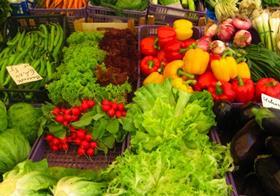
As the European Commission prepares to release new guidelines on quality for agricultural products, European fresh produce association Freshfel Europe has called into question the Commission’s policy and in particular moves to dismantle EU-wide quality standards for 26 fruit and vegetables.
On 1 July 2009, Regulation 1221/2008 will enter into force, introducing a revamped framework of marketing standards for fruit and vegetables. The new standards were approved by the Commission at the end of last year despite widespread opposition from within the fresh produce sector and from a majority of EU member states.
According to a statement issued by Freshfel, many industry players are worried that the new system of standards will increase the amount of paperwork involved in fresh produce trading, leading to an unneccesary increase in costs, while also creating confusion within the supply chain and possibly allowing lower-quality products to be sold on the market.
The new rules will only keep detailed marketing standards for the 10 leading products in terms of volume, while introducing basic conformity checks to secure that all other fruit and vegetables are safe, sound and of marketable quality.
Freshfel General Delegate Philippe Binard commented: “Today, different approaches are being considered across the EU to cope with the new framework, ranging from applying the basic new rules, to adhering to UN/ECE standards for all the products for which detailed rules are not in place at EU level anymore. The setting up of interprofessional agreements or the introduction of private standards are also being tabled. In the absence of clear EU quality guidance, the point of reference for the sector is today unclear, severely endangering the principle of free movement of goods in the EU single market.'
The Commission claims the new scheme will simplify legislation and cut red tape. However, as the date of their introduction approaches, Freshfel says it is becoming obvious that the new rules will not simplify operations nor reduce the administrative or financial burden for the sector.
According to Freshfel estimates, new controls and paperwork will have to be introduced for up to 400 fruit and vegetables in order to verify that all products are sound, safe and of marketable quality.
It is thought that an additional import volume of 1.8m tonnes, much of it in small consignments, will need to be checked against these basic criteria, confronting the sector not only with additional checks and paperwork for issuing conformity certificates but also with what Freshfel terms 'unnecessary' costs.
Uncertainty also remains over whether or not control staff will have had additional training to cope with the new product classifications. 'The phasing out of quality classification provisions for many products could lead to further confusion in the supply chain and lower grade produce being placed on the market,' said Mr Binard.
He continued: 'Today operators still don’t know whether and under which circumstances class labels for those products will be accepted. In addition, control staff do no longer have any legal instruments to stop products not complying with the former classification provisions.'
In the absence of a full and detailed assessment of the new rules' impact on the trade, this week the Commission finally raised a budget of €180,000 to fund a study into issues raised about the new marketing standards.
According to Freshfel, such an initiative should have been conducted long ago. “It is astonishing to note the Commission has only now decided to conduct such an impact assessment, whose result will not be known for a year,' Mr Binard observed.
Freshfel has called on the Commission to 'take action and alleviate the sector concerns'. Mr Binard concluded: 'The Commission is well aware of the sector concerns. If more time is needed to reconsider the issue according to the expectations of the sector, they could easily delay the entry into force of the new framework.'



